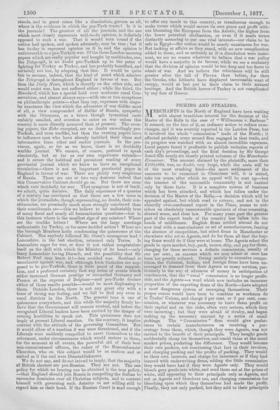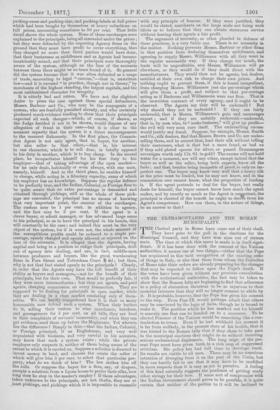PICKING AND STEALING.
fAERCHANTS in the North of England have been waiting with almost breathless interest for the decision of the Master of the Rolls in the case of "Williamson v. Barbour." It seemed, on the face of it, an ordinary action to reduce over- charges, and it was scarcely reported in the London Press, but it involved the whole " commission " trade of the North ; it affected probably every second firm, engaged in that trade, and its progress was watched with an almost incredible eagerness. Local papers found it profitable to publish verbatim reports of each day's proceedings, and the final decision by Sir George Jessel fills nearly six closely printed columns of the Manchester Examiner. The amount claimed by the plaintiffs, more than £100,000, was, no doubt, very large, while the costs will he of the most crushing kind—the mere settlement of the amounts to be examined in Chambers will, it is stated, take ten years, after which an appeal will be sent up—but the interest of the mercantile community is not excited only by these facts. It is a complete system of business which has been attacked, and which has fallen under the decision of the Master of the Rolls,—a decision which will be appealed against, but which read in extenso, and not in the absurdly over-condensed report in the Times, seems to out- siders an absolutely unanswerable specimen of close reasoning, shrewd sense, and clear law. For many years past the greater part of the export trade of the country has fallen into the hands of middlemen. English firms settled abroad do not now deal with a manufacturer or set of manufacturers, fearing the absence of competition, but select firms in Manchester or elsewhere who act as Agents, and do for them all that the buy- ing firms would do if they were at home. The Agents select the goods in open market, buy, pack, insure, ship, and pay for them, charging for these services a definite commission, usually of one per cent., an amount which we may admit at once has been too greatly reduced. Owing mainly to excessive compe- tition, the Colonial, Indian, and foreign firms have been en- couraged to demand from their Agents so many services, par- ticularly in the way of advances of money in anticipation of remittances, that the "usual" commission is no longer profit- able, and the Agents—a word which now includes an immense proportion of the exporting firms of the North—have adopted a most dangerous system of recouping themselves. Their proper course would have been to combine as workmen do in Trades' Unions, and charge 2 per cent. or 3 per cent. com- mission, or whatever was necessary to leave them profit on their capital and on the risks, often very serious, which they were incurring ; but they were afraid of rivalry, and began making up the necessary amount by a series of small pickings. The " Commission " firm would give prefer- ences to certain manufacturers on receiving a per- centage from them, which, though they were Agents, was not carried to the benefit of their principals. They bought goods accidentally cheap for themselves, and resold them at the usual market prices, pocketing the difference. They would become their own packers, not mentioning that fact in their invoices, and charging packing and the profits of packing. They would be their own insurers, and charge for insurance as if they had insured with underwriting firms, adding the little commission they would have had if they were Agents only. They would bleach grey goods into white, and send them out at the prices of white, still appearing to their principals only as Agents, and not as Agents and bleachers too, and charging commission for bleaching upon which they themselves had made the profit. Finally, they not only packed, but they sold to their principals packing-cases and packing-tins, and packing-labels at full prices which had been bought by themselves at heavy reductions on full prices, amounting sometimes to 50 per cent. That little detail shows the whole system. None of these eurcharges were explained to the principals, being all concealed under the prices ; but they were defended by the exporting Agency firms on the ground that they must have profit to cover everything, that they charged no more than third parties would have done, that their businesses as middlemen and as Agents had become inextricably mixed, and that their principals were thoroughly aware of the system, although on the face of the accounts between them there might be no trace found of it. So general did the system become that it was often defended as a usage of trade, amounting to legal "custom,"—that is, unwritten law—and it is excused "in practice, though not in theory," by merchants of the highest standing, the largest capitals, and the most unblemisned character for integrity.
It is utterly bad and rotten. We have not the slightest desire to press the case against these special defendants, Messrs. Barbour and Co., who may be the scapegoats of a system, who are fearfully punished already, and who certainly produced much evidence tending to show that their principals expected all such charges—which, of course, if shown, as the judge decided it not to be shown, would dispose of any allegation of fraud in their case—but it is clear to the meanest capacity that the system is a direct encouragement to the meanest dishonesty. In the first place, the Commis- sion Agent is not only agent, that is, buyer, for another, but also seller to that other,—that is, his interest in one character, which is to sell dear, is totally opposed to his duty in another, which is to buy cheap. In the second place, he incapacitates himself for his first duty to his employer—that of taking advantage of the open market— for he only deals, habitually or even always, with one man, namely, himself. And in the third place, he enables himself to charge, while acting in a fiduciary capacity, sums of which his employer has no knowledge. Suppose the regular defence to be perfectly true, and the Indian, Colonial, or Foreign flrm to be quite aware that an extra per-centage is demanded and obtained through pickings, still as the whole of these pick- ings are concealed, the principal has no means of knowing that very important point, the amount of the surcharges. The custom may be 1 per cent, in addition to agency, and the fact may be 2 per cent. If the agent is a clever buyer, or adroit manager, or has advanced large sums to his principal, so as to have the principal in his hands, this will constantly be the case ; and indeed this must be the very object of the system, for if it were not, the whole amount of the surreptitious profits could be reduced to a single per- centage, openly charged and openly allowed or rejected on the face of the accounts. It is alleged that the Agents, having capital and being in a position to oblige their principals, drift out of agency into dealing, and are, in fact, middle-men between producers and buyers, like the great warehousing firms in Fore Street and Tottenham Court R 'ad; but then, why is not that fact stated openly to the principals ? Clearly, in order that the Agents may have the full benefit of their ability as buyers and managers,—not for the benefit of their principals, but for their own. That would be perfectly fair, if they were mere intermediaries ; but they are agents, and paid agents, charging commission on every transaction. They are supposed to be dealing for principals in open market, while they are dealing in a close market consisting only of them- selves, We can hardly comprehend how it is that so many honourable men defend such a system. When their butlers do it, selling their custom to wine merchants, butchers, and greengrocers for 5 per cent. on all bills, they are loud in their complaints of servants' immorality, and when they can get evidence, send them up before the Magistrate. Yet wherein lies the difference ? Simply in this—that the Indian, Colonial, or Foreign principal, if an Englishman, and very well acquainted with business, and very careful in his accounts, may know that such a system exists ; while the private employer only suspects it, neither of them being aware of the extent to which it is carried on, Suppose a solicitor is directed to invest money in land, and chooses the estate the seller of which will give him 5 per cent. to select that particular pro- perty, what do we think of him ? The law strikes him off the rolls. Or suppose the buyer for a firm, say, of drapers, accepts a solatium from a Lyons house to prefer their silks, how long does he stop in the master's employ ? If these advantages, taken unknown to the principals, are not thefts, they are at least pickings, and pickings which it is impossible to reconcile with any principle of honour. If they were justified, they would be stated, merchants on the large scale not being such idiots as to believe that they can obtain strenuous service without leaving their agents a fair profit. The argument of necessity, so often pleaded in defence of these practices, is a very futile one. There is no necessity in the matter. Nothing prevents Messrs. Barbour or other firms in that position from declaring themselves middlemen, and agreeing to supply Messrs. Williamson with all they want in the regular mercantile way. If they charge too 'much, the trade will be unprofitable, and Messrs. Williamson will go elsewhere, as they would do if they dealt direct with the manufacturers. They would then not be agents, but dealers, entitled at their own risk to charge their own prices. And nothing ought to prevent them, if this is found inexpedient, from charging Messrs. Williamson just the per-centage which will give them a profit, and subject to that per-centage acting as if Barbours and Williamsons were one firm. That is the unwritten contract of every agency, and it ought to be observed. The Agents say they will be undersold ? But why should they not be undersold ? If they are fairly undersold, that is Messrs. Williamson's gain and encourages export ; and if they are unfairly undersold—undersold, that is, by men who, to" make business," will give up profit— the evil will very soon cure itself. The underselling excuse would justify any fraud. Suppose, for example, Messrs. Smith and Co., silk dealers, find that Messrs. Brown and Co. are under- selling them, and to correct that, load their silk without telling their customers, what is that but a mere fraud, as bad as if they sold plated spoons for silver, or passed Brummagem sovereigns worth only 17s. 6d. in gold? The excuse will not hold water for a moment, nor will any other, except indeed that the buyer as well as the seller, being both experts, know all the facts ; and that, besides being incapable of proof, is only an im- perfect one. The buyer may know very well that a heavy silk at the price must be loaded, but he may not know, and in the commission case cannot know, what the proportion of loading is. If the agent pretends to deal for the buyer, but really deals for himself, the buyer cannot know how much the agent makes, and by exactly so much as the Agent is cossipetent, the principal is cheated of the benefit he ought to deriYe from his Agent's competence. How can there, in the nature of things, be an answer to that ?







































 Previous page
Previous page